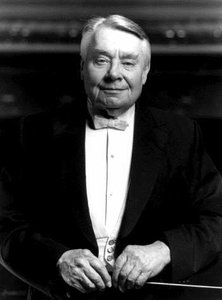Robert Shaw (conductor) facts for kids
Robert Lawson Shaw (born April 30, 1916 – died January 25, 1999) was a famous American conductor. He was best known for his work with the Robert Shaw Chorale, the Cleveland Orchestra and Chorus, and the Atlanta Symphony Orchestra and Chorus. Robert Shaw helped make choral music popular. He was known for teaching younger conductors, making amazing recordings, and supporting fairness for all races in his choirs. He also supported new and modern music. He won many awards during his career.
Biography
Early Life
Robert Shaw was born in Red Bluff, California. His father was a minister, and his mother was a concert singer. He had four brothers and sisters, including the singer Hollace Shaw. Robert went to Eagle Rock High School in the 1930s. There, he sang in choirs led by Howard Swan, who later became a famous choral director.
After graduating from Pomona College in 1938, Shaw got a job with the popular band leader Fred Waring. Waring hired him to find and train a glee club to sing with his band.
Career Highlights
In 1941, Shaw started the Collegiate Chorale. This group was special because it was one of the first to have singers of all races together. In 1948, his group performed Beethoven's Ninth Symphony with the NBC Symphony and conductor Arturo Toscanini. Toscanini was very impressed and said he had finally found the conductor he was looking for. Shaw continued to prepare choirs for Toscanini until 1954. Their choirs were part of many famous performances, including Verdi operas.
Shaw then started the Robert Shaw Chorale in 1948. This group made many recordings and traveled to 30 countries. The U.S. State Department helped them with these tours. In 1953, Shaw became the music director of the San Diego Symphony for four years.
After San Diego, Shaw joined George Szell at the Cleveland Orchestra in 1956. He worked as an assistant conductor there for eleven years. He also took over the Cleveland Orchestra Chorus and made it one of the best volunteer choirs in the country.
From 1967 to 1988, Shaw was the music director and conductor of the Atlanta Symphony Orchestra. In 1970, he also started the Atlanta Symphony Orchestra Chorus. He worked hard to make this chorus as successful as the one in Cleveland.
In 1972, Shaw led a huge choir of 640 singers from 16 different countries at the Lincoln Center for the Performing Arts in New York. This was part of the Third International University Choral Festival. The choirs also performed for First Lady Pat Nixon at the White House.
After 1988, Shaw continued to conduct the Atlanta Symphony Orchestra as a special guest. He also taught workshops for conductors and singers at Carnegie Hall. He even conducted the Atlanta Symphony Orchestra & Chorus during the 1996 Olympic Ceremonies. Robert Shaw passed away in 1999 at the age of 82.
His Influence on Music
Robert Shaw was seen as the "dean" (or leader) of American choral conductors. He taught and inspired many younger conductors and thousands of singers. His work set new high standards for choral music in the United States. Many of his recordings are still considered the best examples of choral singing.
Shaw was a big supporter of modern music. He asked the composer Paul Hindemith to write a piece of music for Franklin D. Roosevelt. Hindemith wrote When Lilacs Last in the Dooryard Bloom'd, a song based on a poem about Abraham Lincoln. Shaw led the first performance of this work in 1946. He continued to perform it throughout his life. In 1998, Yale University gave Shaw an honorary doctorate degree.
Recordings
Robert Shaw made many recordings, not just classical music. He recorded sea songs, glee club songs, religious music, and Irish folk tunes. He was especially famous for his Christmas albums, which are still very popular. Shaw also worked with Arturo Toscanini and the NBC Symphony Orchestra on many radio shows and recordings.
Under Shaw, the Atlanta Symphony Orchestra made its first recordings. One of their first was a Christmas album called Nativity in 1976. He also remade some of his popular Christmas albums, like The Many Moods of Christmas, for the Telarc label. Shaw worked with composer Alice Parker to arrange folk songs, hymns, and Christmas music that choirs still use today.
Shaw recorded for different music labels over the years. From 1977 onwards, most of his recordings were with Telarc. For Telarc, he led the Atlanta Symphony Orchestra and Chorus, and also special groups like the Robert Shaw Chamber Singers. His very last recording was for Telarc, Stabat Mater by Dvořák.
Shaw often recorded famous choral-orchestral pieces more than once. His performances of Handel's Messiah, J.S. Bach's Mass in B minor, and Verdi's Requiem are still highly respected. In 2016, Shaw's recording of Rachmaninoff's Vespers was added to the National Recording Registry of the Library of Congress. This means it is considered an important part of American history.
Awards
Robert Shaw received many important awards, including:
- 14 Grammy Awards
- 4 ASCAP Awards for supporting modern music
- The first Guggenheim Fellowship ever given to a conductor
- The National Medal of Arts from the United States
- France's Officier des Arts et des Lettres
- England's Gramophone Award
- The Kennedy Center Honors in 1991
See also
 In Spanish: Robert Shaw (director) para niños
In Spanish: Robert Shaw (director) para niños
 | Dorothy Vaughan |
 | Charles Henry Turner |
 | Hildrus Poindexter |
 | Henry Cecil McBay |


